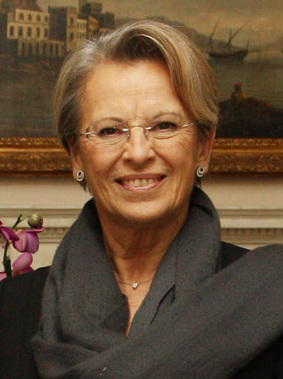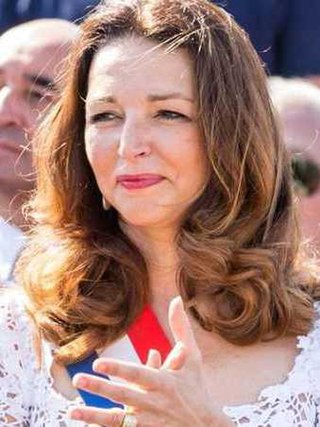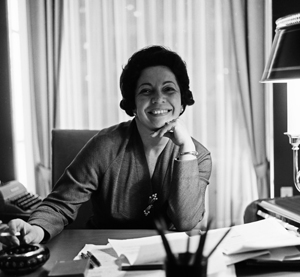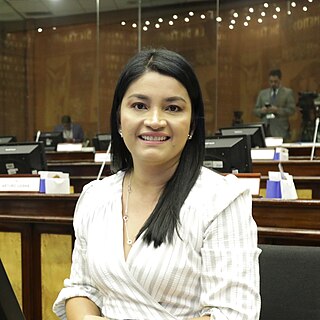Related Research Articles
Lise Bacon is a former Canadian politician who served as Deputy Premier of Quebec from 1985 to 1994. A member of the Quebec Liberal Party,she served as a Member of the National Assembly of Quebec (MNA) for the riding of Bourassa from 1973 to 1976 and again for the riding of Chomedey from 1981 to 1994. She was the second women elected to the National Assembly after Marie-Claire Kirkland. She served as president of the Quebec Liberal Party from 1970 to 1973,making her the first woman elected president of a political party in Canada.

The Plurinational Legislative Assembly is the national legislature of Bolivia,placed in La Paz,the country's seat of government.

Ana María Matute Ausejo was an internationally acclaimed Spanish writer and member of the Real Academia Española. In 1959,she received the Premio Nadal for Primera memoria. The third woman to receive the Cervantes Prize for her literary oeuvre,she is considered one of the foremost novelists of the posguerra,the period immediately following the Spanish Civil War.

Michèle Yvette Marie-Thérèse Jeanne Honorine Alliot-Marie,known in France as MAM,is a French politician and Member of the European Parliament (MEP) from France. She is a member of the Republicans,part of the European People's Party. A member of all right-wing governments formed in the 1980s,1990s and 2000s,she was the first woman in France to hold the portfolios of Defense (2002–2007),the Interior (2007–2009) and Foreign Affairs (2010–2011);she has also been in charge of Youth and Sports (1993–1995) and Justice (2009–2010),and was granted the honorary rank of Minister of State in her last two offices.

Aoua Kéita was a Malian independence activist,politician and writer.
Mambou Aimée Gnali is a Congolese former politician. In 1963 she became one of the first group of women elected to the National Assembly. She subsequently served as Minister of Culture and the Arts from January 1999 to August 2002.

Amadou Lamine-Guèye was a Senegalese politician who became leader of the Parti Sénégalais de l'Action Socialiste. In 1945 he and his associate,Léopold Sédar Senghor,were elected to represent Senegal in the French National Assembly. Gueye was also elected to the French Senate in 1958.

Marie-Claude Vaillant-Couturier was a French Resistance member in World War II as well as a photojournalist,deported to Auschwitz in 1943. She survived the war and became a Communist politician,elected to Parliament under the Fourth and Fifth Republic.

Valérie Boyer is a French politician who has served as a Senator for the Bouches-du-Rhône department since 2020. A member of The Republicans (LR),she was previously elected to the National Assembly from 2007 until 2020. Boyer has also been a municipal councillor of Marseille since 2001.
The BaháʼíFaith in Spain begins with coverage of events in the history of the Bábíreligion in the 1850s. The first mention of Spain in Baháʼíliterature was ʻAbdu'l-Bahámentioning it as a place to take the religion to in 1916. The first Baháʼíto visit Spain was in 1930 and the first pioneer to stay was Virginia Orbison in January 1947. Following some conversions to the religion the first BaháʼíLocal Spiritual Assembly of Madrid was elected in 1948. As of 1959 there were 28 Baháʼís registered in Spain. Following the spread of the religion the first National Spiritual Assembly was elected in 1962. Following the election the breadth of initiatives of the community increased privately until 1968 when the national assembly was able to register as a Non-Catholic Religious Association in the Ministry of Justice and the Ministry of Information and Tourism allowing public religious events and publication and importation of religious materials. Following this the diversity of initiatives of the community significantly expanded. Baháʼís began operating a permanent Baháʼíschool and in 1970 the first Spanish Roma joined the religion. In 1981 the Baháʼís held a separate school in the north central region of Spain to which over 100 people form 26 communities attended and the Spiritual Assembly of Mallorca held several month long classes in computer usage in 1985. Fifty years after the first local assembly there were 100 assemblies. The Association of Religion Data Archives estimated some 13300 Baháʼís in 2005. In 2008 the Universal House of Justice picked the Spanish community to host a regional conference for the Iberian peninsula and beyond.

Maria Esmeralda Arboleda Cadavid was a Colombian politician,suffragist and the first woman elected to the Senate of Colombia,serving from 1958 to 1961.

General elections were held in Spanish Guinea on 22 September 1968 to elect a President and National Assembly that would lead the country when it gained independence as Equatorial Guinea later that year. A second round of the presidential election was held on 29 September.

Marie-Hélène Lefaucheux was a French women's and human rights activist. During World War II,she was a member of the French Resistance and orchestrated her husband's release from Buchenwald concentration camp after he was captured by the Gestapo. She was the sole woman in the French delegation to the first General Assembly of the United Nations. Lefaucheux helped found the UN's Commission on the Status of Women and was its chair from 1948 to 1953.

Yaël Braun-Pivet is a French lawyer and politician who has been President of the French National Assembly since 28 June 2022. The first woman to hold the position,she was re-elected on 18 July 2024 following the 2024 snap election.

Mary Coco Maltez de Callejas was a Nicaraguan feminist,teacher and politician of the Somozista Nationalist Liberal Party. She was a founding member of both the Union of American Women and Ala Femenina,serving as the vice president of the latter organization from its founding in 1955 to 1971,when she became president. She was one of the first three women to run for and be elected to the Chamber of Deputies in 1957. After her initial election,she served in the National Assembly until 1979. Between 1969 and 1979,she served as the Minister of Education. In her latter years,she participated in the Alliance of Pan American Round Tables.

Oskar Matute García de Jalón is a Basque politician and a member of the Congress of Deputies of Spain. He was previously a member of the Basque Parliament.
Tessa Fowler is a Vanuatuan former politician. She and Mary Gilu were the first women elected to the New Hebrides Representative Assembly,serving from 1975 to 1977.
Cristina Makoli Biere was an Equatoguinean politician. In 1968 she was one of the first two women elected to the National Assembly.
Claudia Nonhlanhla Ndaba is a South African politician. A member of the African National Congress,she served as the Chairperson of the Portfolio Committee on Women,Youth and People with Disabilities from 2019 until 2024 and a Member of the National Assembly of South Africa from 2014 until 2024. She served as Chairperson of the Ad Hoc Committee on the Filling of Vacancies in the Commission for Gender Equality twice during her first term in parliament. Prior to her election to parliament,Ndaba served as a Member of the Gauteng Provincial Legislature from 2009 to 2014.

Victoria Tatiana Desintonio Malavé is an Ecuadorian politician. She was elected to the seven-member Council for Citizen Participation and Social Control by popular vote and she was later removed. She then became a member of Ecuador's National Assembly. She is a member of the political coalition Union for Hope and she campaigns for women's rights.
References
- 1 2 Rafael de Mendizábal Allende (2018) Misión en África. La descolonización de Guinea Ecuatorial (1968-1969) p102
- ↑ Mart Martin (2000) The Almanac of Women and Minorities in World Politics, p131
- ↑ Max Liniger-Goumaz (1979) La Guinée équatoriale: un pays méconnu, p157